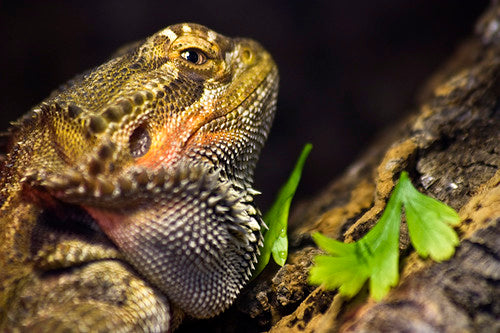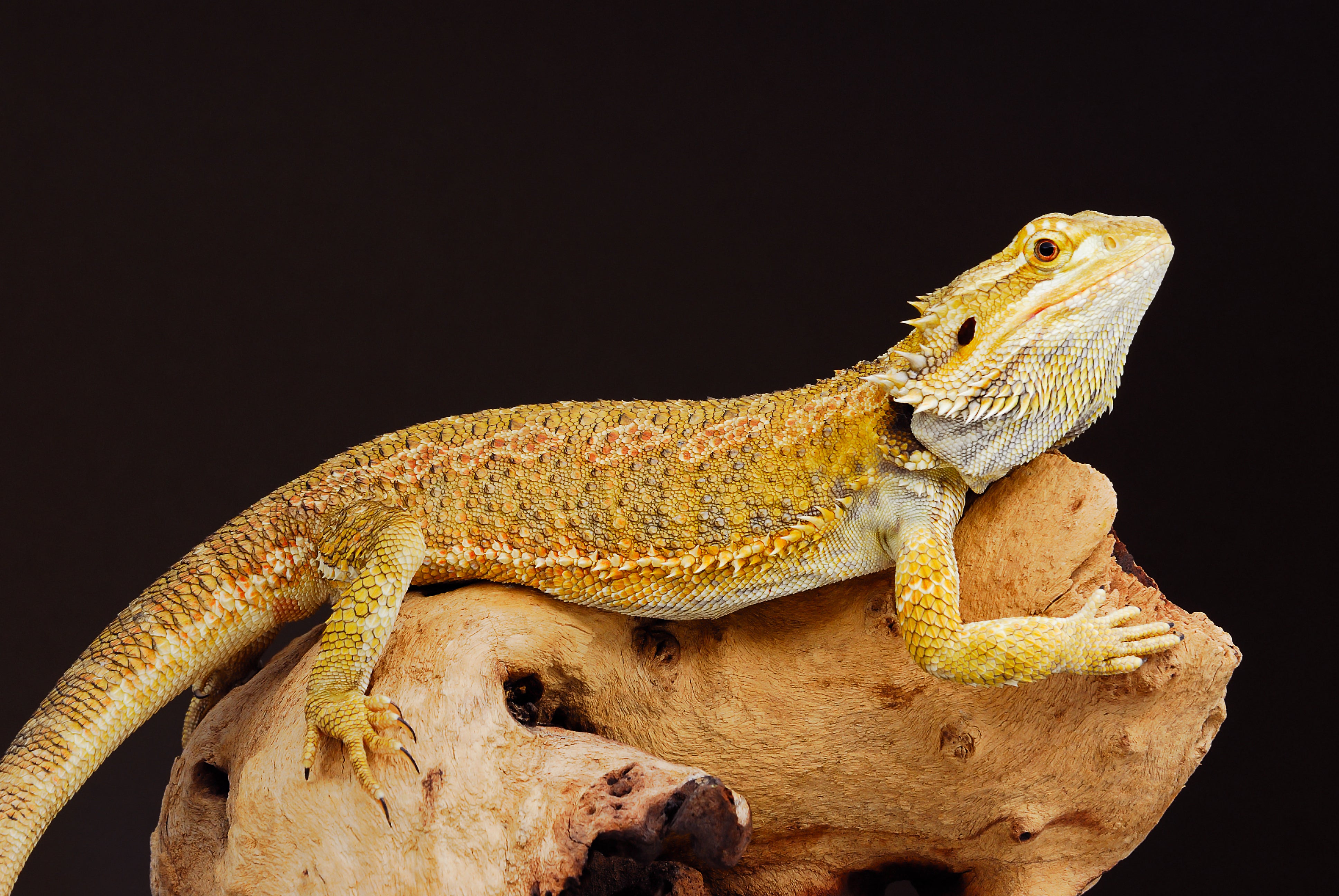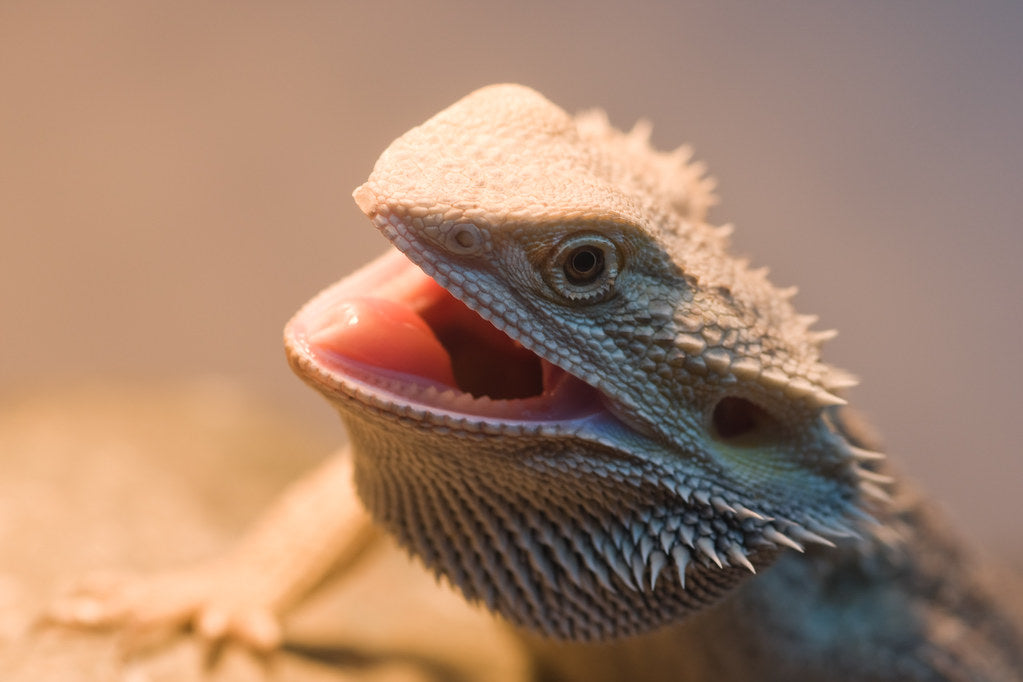Bearded dragons are omnivores, which means that they evolved to get their nutrition from a variety of different foods, both plant- and animal-based. This also means that if your bearded dragon only seems willing to eat the same handful of foods all the time, this can harm their health by creating nutritional deficiencies.
To encourage your bearded dragon to broaden their dietary horizon, first you need to figure out what may be the cause.
You’re feeding your beardie too many bugs
Bearded dragon’s dietary needs change based on their stage of life:
- Hatchlings (0-6 months old): Insects 2x/day, vegetables daily
- Juveniles (6-12 months): Insects 1x/day, vegetables daily
- Adults (12+ months old): Insects 1-2x/week, vegetables daily
If your current feeding schedule differs from what is outlined above, then that might be the reason why your bearded dragon is acting so picky. While it’s essentially impossible to feed a bearded dragon too many vegetables, it’s common for them to be getting too many bugs.
A bearded dragon that gets too many bugs is likely to reject vegetables, because bugs taste better than vegetables. Bugs are also higher-calorie than vegetables, which means that they’re less likely to feel hungry in general.
The best way to correct this problem is by fixing your feeding schedule and double-checking the proportions in your beardie’s diet. Hatchlings should have 60-80% as insects, 60% for juveniles, and just 15% for most adults, unless you have a female that is working on eggs or recovering from laying them.
You’re offering too many treats
Do you like to give treats to your bearded dragon? It’s common for keepers to try to express their love for their pets by giving them treats. A small treat once a week or so is unlikely to cause problems, but if you offer treats that are too big or too frequent, you might be ruining your dragon’s appetite.
Aside from encouraging your bearded dragon to eat more normal foods, reducing the number of treats in their diet is likely to help prevent obesity, keep their organs working well, and guard against dental decay.
If you miss the thrill of interacting with your beardie, try hand-feeding them their normal foods with a pair of soft-tipped feeding tongs!
You’re not providing enough variety
As mentioned at the beginning of this article, bearded dragons are built to eat a variety of different foods. If you’ve been feeding your beardie the same rotation of greens and feeder insects for a while, it’s possible that they’ve simply become tired of getting the same-old-same-old. Alternatively, it’s possible that they’ve become so accustomed to their regular foods that they don’t recognize anything new as being edible.
Either way, it’s important to make sure that your bearded dragon is eating a varied diet — as varied as possible. If your bearded dragon has lost their appetite because they’re stuck in the same routine, offering new foods for them to try should perk them up.
If your bearded dragon is turning up their nose at new foods, the only way to get them to consider alternatives is to stop offering familiar foods for them to lean on. Of course, every bearded dragon has different preferences, so if they consistently reject a particular food, it may simply be that they’d rather try something else.
Your beardie isn’t feeling well
Appetite loss is one of the most common early symptoms of a lizard that isn’t feeling well. Reptiles are very good at hiding when they’re sick, because in the wild, that helps them avoid predators. This means that it’s your job as the owner to keep a close watch for symptoms of potential trouble.
If your bearded dragon has gotten pickier about the things they’ll eat, and none of the above explains the change, check your dragon’s setup. Are the basking and air temperatures within range? Is your UVB more than 12 months old and due for replacement? Check our bearded dragon care sheet.
However, if the care sheet doesn’t help and everything more or less still looks good, take your bearded dragon to an experienced reptile veterinarian to get checked out.
Conclusion
Under normal circumstances, bearded dragons shouldn’t be picky — after all, in the wild, they have to eat whatever they can get in order to survive. A picky bearded dragon means that something is wrong. Check your feeding schedule, feeding rotation, and husbandry to see what might need to be fixed!
"Content Bearded Dragon" by Ben Christian Photos is marked with CC BY-NC-ND 2.0




Leave a comment
All comments are moderated before being published.
This site is protected by hCaptcha and the hCaptcha Privacy Policy and Terms of Service apply.